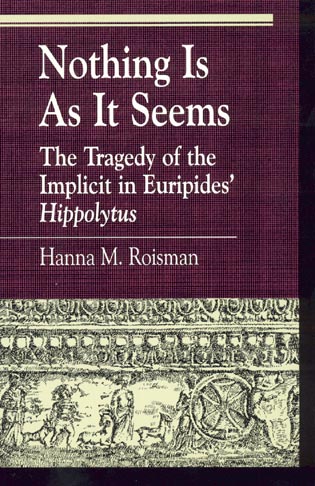Greek Studies: Interdisciplinary Approaches
Foreword by Gregory Nagy, General Editor
 Nothing Is as It Seems: The Tragedy of the Implicit in Euripides’ Hippolytus, by Hanna M. Roisman, is an insightful re-examination of a Classical masterpiece from the standpoint of drama as drama. In her reading of Euripides, the author of this book engages her own experience as a lifelong theater-goer and as a perceptive reader of drama in its essence, as it is performed on stage. What she has learned from a lifetime of watching actors act—even from watching actors being interviewed about their acting—is that their main task is to figure out what makes the characters they play “tick.” In other words, what are their motivations?
Nothing Is as It Seems: The Tragedy of the Implicit in Euripides’ Hippolytus, by Hanna M. Roisman, is an insightful re-examination of a Classical masterpiece from the standpoint of drama as drama. In her reading of Euripides, the author of this book engages her own experience as a lifelong theater-goer and as a perceptive reader of drama in its essence, as it is performed on stage. What she has learned from a lifetime of watching actors act—even from watching actors being interviewed about their acting—is that their main task is to figure out what makes the characters they play “tick.” In other words, what are their motivations?
This is not to say that any given character has one and only one motivation, only that there is one that overrides the others. Thus each character has his or her own agenda, working toward a personal goal. Roisman’s point is that these agenda may be implicit, not explicit. She demonstrates that communication on the implicit level is much more powerful in ancient Greek drama than we tend to assume.
Unlike Senecan drama, engulfed in passion as it is, Euripidean tragedy tends to rein in the emotions rather than display them coram populo. An ideal case in point is Phaedra’s confession speech in Euripides’ Hippolytus. If Roisman’s interpretation is right, then Greek tragedy operates on the basis of deception (her wording)—not only an obvious deception such as Phaedra’s calumnious accusation in her letter but an overall way of thinking that is far more subtle, far deeper beneath the surface, than what it seems on the surface. Subtlety renders Phaedra’s character more plausible. For Roisman, such subtlety is the key to plausibility of character, so valued by Aristotle. It is precisely such subtlety, she contends, that lives on as the prime legacy of ancient Greek theater. In effect, Roisman’s interpretation not only presumes but vindicates the capacity of theater’s ancient audiences to engage in dialectical discourse with its ever compelling characters.
—Gregory Nagy
Building on the foundations of scholarship within the disciplines of philology, philosophy, history, and archaeology, the Greek Studies: Interdisciplinary Approaches series published by Rowman & Littlefield concerns not just the archaic and classical periods of Greek traditions but the whole continuum—along with all the discontinuities—from the second millennium BCE to the present. The aim is to enhance perspectives by applying various disciplines to problems that have in the past been treated as the exclusive concern of a single given discipline. Besides the crossing-over of the older disciplines, as in the case of historical and literary studies, the series encourages the application of such newer ones as linguistics, sociology, anthropology, and comparative literature. It also encourages encounters with current trends in methodology, especially in the realm of literary theory.
As part of its mission of bringing together a variety of research interests centered on Hellenic civilization and sharing them with a wider audience, the Center for Hellenic Studies offers free access to over 100 books and articles. If you have not done so already, we invite you to browse our online publications!
